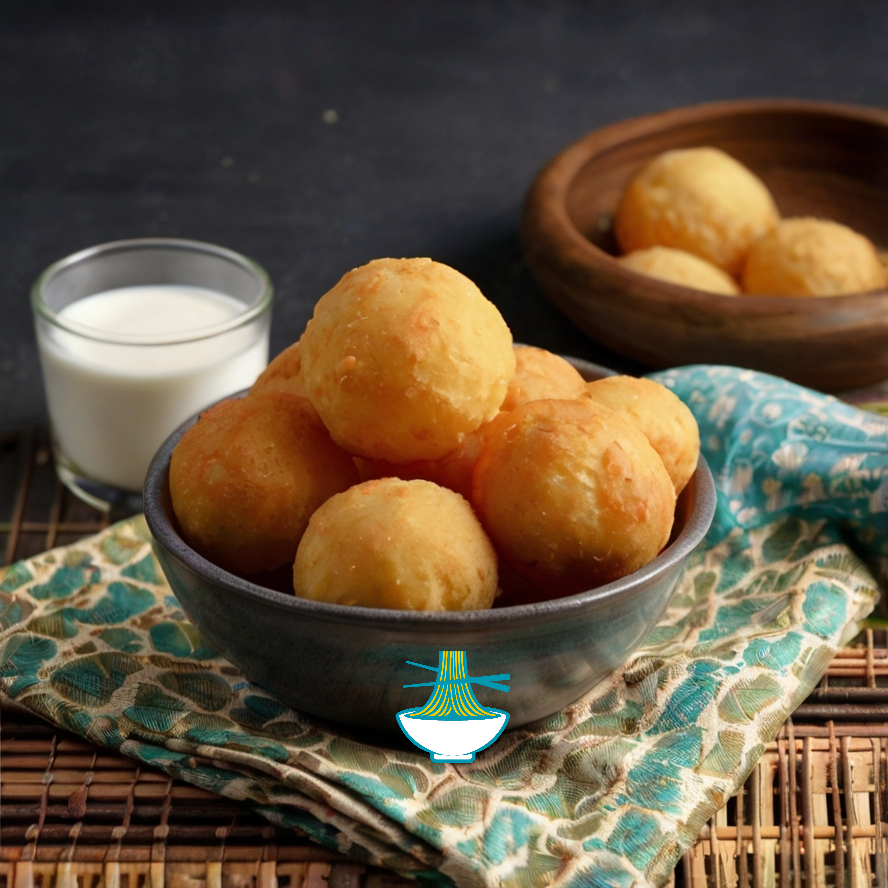Congo Mikate is a cherished traditional snack from the Democratic Republic of Congo, celebrated for its simplicity and delightful taste. These small, fried dough balls are commonly enjoyed as a breakfast treat or snack, often sold by street vendors throughout the country. Known for their golden-brown exterior and fluffy interior, Mikate offers a satisfying culinary experience with minimal ingredients.

Mikate holds a special place in Congolese culture as a popular street food. Its origins can be traced back to the traditional cooking methods of Central Africa, where frying dough was a common technique for creating delicious and portable snacks. The recipe reflects the resourcefulness of local cuisine, utilizing basic ingredients to create a versatile and enjoyable food item.
Ingredients
- 3 cups all-purpose flour
- 1 packet (2 1/4 tsp) instant yeast
- 1/4 cup granulated sugar
- 1 tsp salt
- 1 1/2 cups warm water
- Vegetable oil for frying
Instructions
1. Prepare Dry Ingredients: In a large mixing bowl, combine flour, yeast, sugar, and salt. Mix well.
2. Form Dough: Gradually add warm water to the dry ingredients, stirring constantly to form a sticky dough.
3. Knead Dough: On a floured surface, knead the dough for 10-15 minutes until smooth and elastic.
4. Let Dough Rise: Place the dough in a greased bowl, cover with a clean cloth, and let it rest for 2-3 hours in a warm place until doubled in size.
5. Shape Dough: After rising, knead the dough again briefly, then divide into small balls about the size of a golf ball.
6. Heat Oil: Heat vegetable oil in a deep fryer or heavy-bottomed pot to 350°F (175°C).
7. Fry Mikate: Carefully add dough balls to the hot oil, avoiding overcrowding. Fry for 2-3 minutes until golden brown on all sides.
8. Drain Oil: Use a slotted spoon to remove Mikate from the oil and drain on a paper towel-lined plate.
Notes
- Use instant yeast to ensure quick rising of the dough.
- A heavy-bottomed pot can be used if a deep fryer is not available.
- Maintain the correct oil temperature for even cooking and to avoid greasy Mikate.
- Serve warm with tea or coffee for an enjoyable snack or breakfast.
Congo Mikate is not only a tasty treat but also a reflection of the rich culinary traditions of the Democratic Republic of Congo. Its ease of preparation and satisfying taste make it a favorite among locals and a delightful discovery for anyone exploring Congolese cuisine.

Nutrition Value:
1. All-Purpose Flour (3 cups)
- Calories: 1,320
- Carbohydrates: 275 grams
- Protein: 36 grams
- Fat: 3 grams
- Sodium: 0 milligrams
- Cholesterol: 0 milligrams
- Vitamins: Contains small amounts of B vitamins (thiamine, riboflavin, niacin)
- Minerals: Contains iron and calcium
- Nutritional Benefit: All-purpose flour is a primary source of carbohydrates, providing energy. It also contributes to the intake of essential B vitamins and minerals like iron, which supports overall metabolic function and oxygen transport.
2. Instant Yeast (1 packet or 2 1/4 tsp)
- Calories: 21
- Carbohydrates: 2 grams
- Protein: 3 grams
- Fat: 0 grams
- Sodium: 0 milligrams
- Cholesterol: 0 milligrams
- Vitamins: Contains B vitamins (especially B1 and B6)
- Minerals: Contains trace amounts of potassium and magnesium
- Nutritional Benefit: Instant yeast helps in leavening dough, making it rise. It provides B vitamins, which are essential for energy metabolism and red blood cell production.
3. Granulated Sugar (1/4 cup)
- Calories: 200
- Carbohydrates: 50 grams
- Protein: 0 grams
- Fat: 0 grams
- Sodium: 0 milligrams
- Cholesterol: 0 milligrams
- Vitamins: No significant vitamins
- Minerals: No significant minerals
- Nutritional Benefit: Granulated sugar adds sweetness and energy to recipes but provides little nutritional value beyond calories.
4. Salt (1 tsp)
- Calories: 0
- Carbohydrates: 0 grams
- Protein: 0 grams
- Fat: 0 grams
- Sodium: 2,300 milligrams
- Cholesterol: 0 milligrams
- Vitamins: No vitamins
- Minerals: Sodium
- Nutritional Benefit: Salt enhances flavor and helps with preserving food. However, excessive intake can contribute to high blood pressure and other health issues.
5. Warm Water (1 1/2 cups)
- Calories: 0
- Carbohydrates: 0 grams
- Protein: 0 grams
- Fat: 0 grams
- Sodium: 0 milligrams
- Cholesterol: 0 milligrams
- Vitamins: No vitamins
- Minerals: No minerals
- Nutritional Benefit: Water is essential for hydration and aids in the proper functioning of all bodily systems. It also helps in dissolving ingredients and activating yeast.
6. Vegetable Oil for Frying (assumed 1 cup)
- Calories: 1,900
- Carbohydrates: 0 grams
- Protein: 0 grams
- Fat: 220 grams
- Sodium: 0 milligrams
- Cholesterol: 0 milligrams
- Vitamins: Contains vitamin E (in small amounts)
- Minerals: No significant minerals
- Nutritional Benefit: Vegetable oil provides fat, which is a source of energy and essential fatty acids. Vitamin E in vegetable oil acts as an antioxidant, helping to protect cells from damage.
This breakdown should provide a clear understanding of the nutritional content and benefits of each ingredient.


Comments